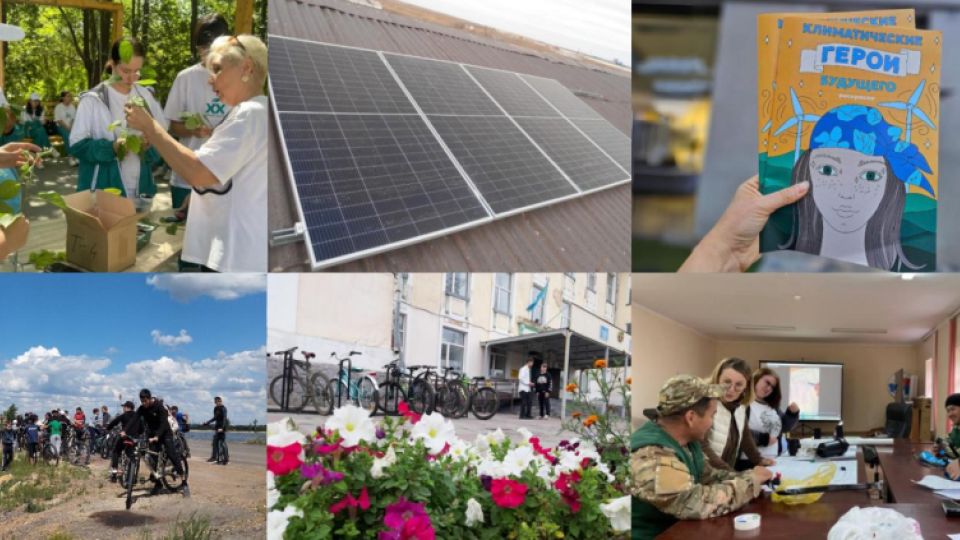KARAGANDA / PRAGUE- Small-scale projects implemented by schools, civic initiatives and students were financially supported in the Karaganda Region by EcoMuseum (Karaganda) and Arnika (Czech Republic) within the project ‘Participation of the civil society in mitigation of the climate change in Karaganda Oblast of Kazakhstan’ funded by the European Union and Czech governments, 16 projects have received more than EUR 40,700 (40 million KZT).(1)
The Our Response to Climate Change programme provided a total of twelve small grants for environmental projects, implemented by various organisations from media projects to NGOs and schools. Six were of a practical nature and received a total of over €12,000, and six focused on particularly promising journalists and public communication on climate change issues and received around €4,200. The programme funded a wide range of activities, from new bike parking and irrigation system upgrades to a series of infographics, reports and public meetings.(2)
"It is a combination of practical improvements and awareness-raising activities that puts into practice the fact that it is not enough to warn about the consequences of climate change, but also to propose and implement practical, local solutions," comments Dmitriy Kalmykov, EcoMuseum's Development Director.
In addition, four EU-funded pilot projects have been carried out to demonstrate some of the possible responses to the climate crisis, from improving energy efficiency to promoting cycling. The aim is not only to reduce emissions and energy consumption, but also to make the places where the projects are carried out more comfortable and accessible.(3)
For example, the lighting in the N32 women's prison in the city of Karaganda has been renovated. Twenty-nine lamps were replaced and a further six were handed over for further replacement. In addition, solar panels with a capacity of up to 2 kWh were installed on the roofs to provide an autonomous source of renewable energy.
Bicycle parking has also been provided at four schools. Improving cycling infrastructure encourages environmentally friendly and healthy transport, while helping to reduce traffic emissions in cities such as Karaganda and Temirtau, which have chronically high levels of air pollution. Additional bicycle parking has also been set up at the EcoMuseum to serve its staff and visitors. Among the pilot projects is the replacement of lighting in a school for children with special needs. 178 energy-saving LED lights were installed and another 46 for the lighting of the blackboards.
“Installing LED lighting in classrooms is not only about reducing energy consumption, but also an important step towards creating a comfortable and safe environment for our children with special developmental needs. Proper lighting contributes to more effective learning, allowing each child to unlock his or her potential,” notes Boldyrgan Alisherovna, Director of Boarding School No. 6.
In another pilot project, a shading system was installed directly in the EcoMuseum - sunshades that protect the museum's exhibition hall from heat and UV radiation. This will both reduce summer temperatures by several degrees and significantly reduce the need for air conditioning. Energy consumption will be reduced by about a third, which also means a reduction in the ecological footprint.
Martin Skalský of the Czech non-governmental organisation Arnika adds that for a long time, the topic of climate change was mainly a preserve of experts and academics."But we also know from Europe that if the climate crisis is to be tackled responsibly, the debate has to move to the public level. Not to scare people, but to be active and look together for ways to describe the problem, to actively address it and to actively seek participation in decision-making," he concludes.
As part of the project, organisations contributed to raising awareness of climate change in Kazakhstan, including developing the first ever draft local climate strategy for the Karaganda region.(4)

ANNEXES
- Details of the climate change adaptation and mitigation projects in Karaganda Region: https://ecocitizens.kz/grants
- An overview of the small grants projects
Bicycle parking in 2 schools (Karaganda city)
Implementing subject: The Kazakhstan Association of Students, Doctoral Candidates and Alumni of Hungarian Universities
Two bicycle parking lots were created in two schools. A. Ermekov’s Lyceum and Gymnasium No. 14 in Karaganda.
Transport generally accounts for about one-fifth of global greenhouse gas emissions, with road transport accounting for a significant majority. Reducing car use and promoting emission-free alternatives is thus an obvious step for cities looking to reduce their carbon footprint and the massive pollution typically associated with cars. As the World Health Organization states, cycling is intuitively good not only from a health perspective, but also as one of the tools to mitigate climate change. Cyclists are often prevented from using their bikes by the lack of infrastructure, which the project provides at least to some extent.
EcoWatering (Karkaraly National Park)
Implementing subject: Public Association “Center for Coordination and Information on Environmental Education ‘EkoObraz’
The project is improving the efficiency of water use in the pine seedling nursery in Karkaraly National Park. This will contribute to reforestation and climate change adaptation. All the equipment needed to cover 1 hectare - where about 220,000 seedlings are grown - of the nursery was purchased, followed by two specialised training courses for staff and local communities to master the drip irrigation system and to raise awareness of climate change and adaptation methods among project participants and the general public.
As a result of the drip irrigation system implementation, it is planned to reduce water consumption of the nursery by 30-50% compared to traditional irrigation methods. The use of drip irrigation is expected to improve conditions for the growth and development of seedlings, and to increase their survival rate by 20-30%, thus accelerating the reforestation process in Karkaraly National Park. The new system is also expected to halve current labor costs for plant care, allowing the staff to invest its resources elsewhere.
Tree nurseries in the schools (Temirtau)
Implementing subject: Otrazhenie
Establishment of two small nurseries in two schools in the Karaganda region and a larger one (covering about 1 hectare) at the Zhosaly sanatorium. Seedlings and seeds were also purchased, as well as information material to raise awareness of the planting in schools and among the general public. This will contribute to the conservation of biodiversity in the region and help reduce greenhouse gases, as trees are fixing carbon.
‘Green wall’ in a university (Karaganda)
Implementing subject: E.A. Buketov Karaganda University
This project greened Karaganda University of E. A. Buketov. It involved spreading of waste collection and recycling practices, internal greening of buildings of the university campus with the use of hydroponic systems and a vegetated "green wall": which both makes the university environment more pleasant and contributes to reducing air pollution and making the air more humidified.
‘Our Response to Climate Change’ (Saran)
Implementing subject: ‘Boarding School No. 7’, Karaganda region, Saran city
Various activities were organised at the school to raise public awareness of environmental issues and climate change. For example, there was a campaign on cycling involving parents, the wider community, cycling instructors and traffic police. A topical round table with school representatives has been organised, and pupils are taking part in optional classes on ecology. On the practical side, a cycling club has been organised, which includes both trips and clean-ups of public spaces.
Photo exhibition "За кадром" (Karaganda, various cities)
Implementing subject: Photo club Karaganda
Another grant paid for a photo exhibition by both already well-known and younger Karaganda nature photographers. The images showed the beauty of nature and how it is changing due to climate change in open-air exhibitions in Astana, Karaganda, Balkhash and Temirtau.
‘How is the climate changing us’ project
Implementing subject: Climate hub in Kazakhstan
The "Climate Hub in Kazakhstan" project produced infographics explaining various aspects of climate change. Materials were published on the Hub's Instagram page, communicating scientific data, and facts. There was also a competition for mainly young viewers to create their own material on climate change, such as videos.
‘Women and the climate change’ project
Implementing subject: @E.Quality
The project focused on women's experience of climate change, producing various informational content on Instagram page @E.quality, including an interview with female experts in both Kazakh and Russian language. It highlighted that women are most affected by disasters and lack representation in decision-making and science.
‘Climate Heroes of the Future’ coloring book
Implementing subject: Aliya Vedelikh, EcoStan News
Aliya Vedelikh from the EcoStan News portal also made a coloring book with eco-tips for both pre-school and school age children. It was originally online, but the high quality of the work led the team to reconsider and to also provide a printed release – which is distributed for free. The material helps to fill a long-standing lack of accessible materials on climate change in the Kazakh language.
Video study ‘Impact of the quality of heat and electricity supply to villages and private houses in cities on Kazakhstan's share in global greenhouse gas emissions’
Implementing subject: Alena Pankova, ‘What are you breathing’ YouTube channel
Alena Pankova from the YouTube channel "What are you breathing" got resources to do a project about people in small villages with no electricity. The author has highlighted problems in communities on the periphery and sparked debate on the topic - and also plans to continue raising this topic of energy problems and the impact of Kazakhstan's energy sector on climate change.
Public discussion meetings on the climate crisis (Astana)
Implementing subject: Beimälim.eco
Thanks to the grant, the Beimälim.eco initiative held public meetings in Astana on climate change, attended by over 60 people. The idea was that discussing topics in a friendly environment allows participants not to feel isolated and helps them to study and understand the problem. Participants had the opportunity to ask questions directly to the experts and speakers. This concept proved itself, as the organisers received enthusiastic and inspired feedback about the events and visitors decided to get more involved in the environmental agenda.
‘Information nature and visual reflection of climate change in Kazakhstan’
Implementing subject: Alash.kz portal
The project includes interviews with scientists from laboratories of the Kazakh National university. Based on the results of the interviews, information materials in Kazakh language will be prepared with scientists on the impact of climate change on Kazakhstan and scientific achievements of environmental scientists.
- Detailed information about the pilot projects, including their budgets, can be found at: https://ecocitizens.kz/news/demonstration-projects-climate
- Climate Change Action Strategy of the Karaganda Region







